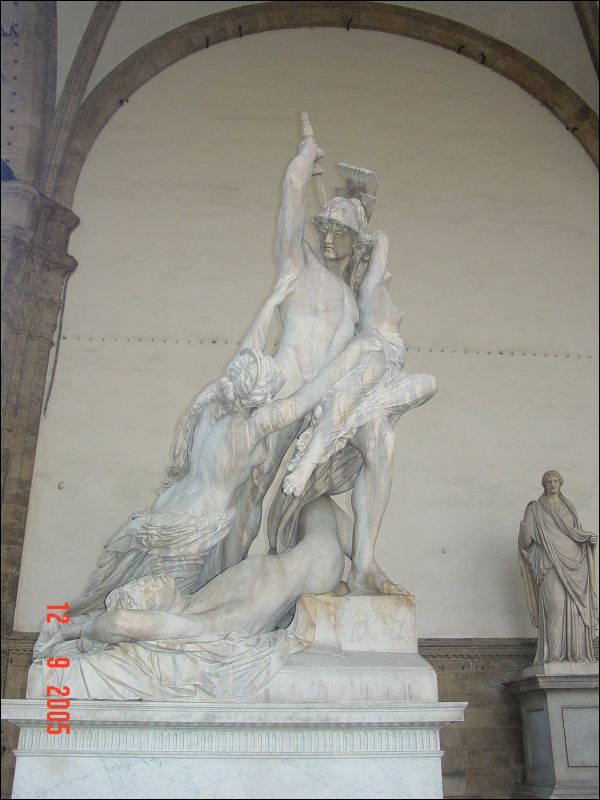|
Iphigenia was sacrificed for the Greeks, signifying the beginning of the Trojan War with the launching of Greek ships. Polyxena is Iphigenia's Trojan counterpart. Polyxena, however, was sacrificed in Troy, signifying the end of the war. Polyxena was the youngest daughter of Priam, king of Troy, and Hecuba. According to legend, Polyxena went with her brother Troilus to a fountain where he watered his horse. Achilles appeared and slew Troilus. When Achilles caught sight of Polyxena, he fell in love with her. Hector, Polyxena's brother, was eventually killed by Achilles. Achilles ransomed the Hector's corpse for its weight in gold. When the Trojan's gold fell short, Polyxena is said to have thrown down her golden bracelets from the towers of Troy. Another story says that Polyxena offered herself as a slave to Achilles in return for her brother's lifeless body. Either way, Polyxena is represented as a loyal sister. Achilles was apparently so smitten with the young princess that he told Priam that he would try to form a peace between Troy and Greece in return for Polyxena. However, Achilles stated that Helen would have to be returned to the Greeks. Priam refused to give up Helen, but stated that if Achilles could make a peace, he would give him Polyxena. Polyxena, probably at the prompting of Paris, sent for Achilles and asked him to meet her and Deiophobus, her brother, in the temple of Thymbraean Apollo (Bell, 377). At the temple, she assured Achilles, they would complete the marriage arrangement. Achilles came and Paris, who had been hiding in the bushes, shot Achilles in his vulnerable heel. Achilles died in the arms of Odysseus, Ajax, and Diomedes, all of whom had followed him to the temple. Achilles asked Odysseus, Ajax, and Diomedes to sacrifice Polyxena at his tomb after Troy was defeated. It is debatable whether he asked for this sacrifice out of love (in the hopes to marry her in the afterlife) or out of revenge (for he would have known she betrayed him). In the Troades, it falls to Helen to retrieve Polyxena for the sacrifice. Just as Iphigenia was taken to be sacrificed under the pretenses that she was going to marry Achilles, Polyxena was taken under the ruse that she was to marry Pyrrhus (Neoptolemus), son of Achilles. In the Troades, Andromache, ironically, after hearing of Polyxena's future marriage to Pyrrhus, calls upon the Trojan women to "celebrate worthily" as if the marriage were a funeral. Andromache implores them to "let beatings and groans sound" - the sounds of a funeral. Quite eloquently, Andromache says the burning Troy to be the "wedding torch." Andromache, therefore, compares this wedding to the final destruction of Troy. In the Troades, Agamemnon opposes the sacrifice of Polyxena (much as he, at first, opposed the sacrifice of his own daughter, Iphigenia). The difference between the two, however, is that Iphigenia's death was necessary for the Greek fleets to reach Troy. Polyxena, however, is an innocent maiden. The war is over, and it is a grave which calls for her sacrifice. Hyginus, in Fabulae, agrees with the idea that Polyxena led Achilles into a trap. However, Hyginus asserts that Achilles demanded Polyxena's sacrifice from the grave, and not when he was dying, as the Trojan's were dividng the plunder. Hyginus, then, calls Polyxena "part of the spoils." In the war, the status of women fell lower than their status during times of peace. Polyxena, then, along with all the other captive Trojan women, were little more than objects to be traded amongst the warriors. They had no real standing, and were, in fact, spoils of war. Interestingly, in the funeral games Achilles organizes for Patroclus, one of the prizes is a woman who is said in the Iliad to be "skilled in much work of her hands, and they rated her at four oxen" (23.702-5; Blundell, 48). Polyxena was then sacrificed at the tomb of Achilles. Seneca, in his Troades, depicts Polyxena as a strong, valiant maiden, who does not shy away from her doom. This is perhaps a reflection of Seneca's Stoic philosophy. He describes her as even more beautiful than usual as she goes to her death. As she dies, Seneca states that Polyxena does not go quietly, but instead states that she "did not lay down her spirits; She fell so that she would make the earth weigh on Achilles, prone and with an angry attack." Seneca, however, gives Polyxena's valiant effort a tragic end, stating that "the blood having been shed did not stand or flow on the surface of the earth; the savage mound immediately swallowed and drank all of the blood." Some authors give the fate of Polyxena a romantic twist, stating that her sacrifice was actually her marriage to Achilles and, after her death, Polyxena went to live with Achilles on the White Isle, with his mother, Thetis
|
![[First]](bw_first.gif)
![[Prev]](bw_prev.gif)
![[Index]](bw_index.gif)
![[Next]](bw_next.gif)
![[Last]](bw_last.gif)

![[First]](bw_first.gif)
![[Prev]](bw_prev.gif)
![[Index]](bw_index.gif)
![[Next]](bw_next.gif)
![[Last]](bw_last.gif)